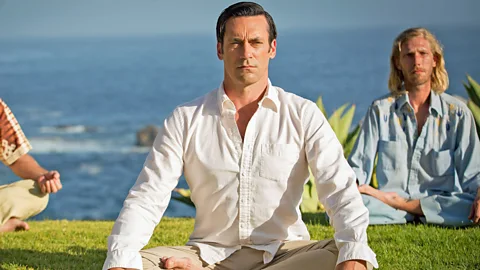Mad Men: The final verdict
 AMC Networks
AMC NetworksThe period drama was one of the most acclaimed shows of all time, but its finale was polarising. What did it all mean? Owen Gleiberman takes a look.
The final episode of The Sopranos, in 2007, set the gold standard of how to bid farewell to a visionary television series: end it with something so mind-boggling in its audacity that some viewers may love it and some may hate it, but no one will be able to stop talking about it. It’s seriously doubtful that the final episode of Mad Men will ever inspire that kind of fervour, even though the series was every bit the artistic equal of The Sopranos – or, in my opinion, even greater. True, the last episode did build to a spectacular punchline: it said that Don Draper would go on to create the legendary Coca-Cola commercial that pictured a hilltop of fresh-faced hippie youths singing I’d Like to Buy the World a Coke (And Keep It Company). In doing so, the series suggested that Don wound up inventing an entirely new age of advertising: the one in which Madison Avenue finally figured out how to co-opt the ‘60s. From that point on, advertising would always know how to turn ‘rebellion’ into capitalism.
Yet if the Coke commercial ending was memorable, it was still all too obvious that Matthew Weiner, the creator of Mad Men, devised that ticklish moment first and then worked backward, trying to figure out – laboriously – how to get there. In the final season, Don’s moody odyssey, which ultimately led him to a New Age therapy retreat – the inspiration for the commercial – was less a convincing culmination of the Mad Men saga than a half-baked series of metaphors strung together.
Don was supposed to be having an existential midlife breakdown, but as he ran out of gas, so did the series; it became forced and cryptic and didactically dreary. By the end, the show was practically shouting: “Don must change! He must find a new way!” But what Weiner forgot, or at least perversely put on hold, was exactly how much we loved the old way. For the ultimate beauty of Mad Men is that Don Draper – lush, liar, womaniser, man of false identity – has always been so much more than the sum of his pathologies. What too many commentators have missed over the years is that we loved Don not in spite of his bad behaviour but, to a large degree, because of it. He may have been a scoundrel, but he was the most compelling male shark in pop culture since Sean Connery’s James Bond.

For the first few seasons, he wasn’t just living a double life; he was undercover, like a spy without a country. The appeal of Don’s duplicity lay in how it emerged from the show’s powerfully nostalgic, but authentic, depiction of the early 1960s. In the first episode, when Don cavorted with his bohemian lover and then arrived at his suburban home to the tune of On the Street Where You Live, the irony couldn’t have been more fantastic: Don’s adultery seemed like his real life, and his home seemed the place that he was visiting.
From the start, Mad Men suggested that Don slept around not just because he was selfish or dysfunctional but because he lived in a time and place that couldn’t contain his appetites. He was a straight arrow in a fedora who was really, in his heart, an unruly libertine living out an early version of the counterculture dream. He got high every day (on whiskey), practised free love and was even a kind of draft dodger – though his evasion of military service happened when he was already trapped in it. This may all sound like a rationalisation for Don’s amorality, but such is Mad Men’s sexy logic that Don’s prowling made him into a kind of film noir antihero – a captive of desires the audience didn’t want to see reined in.
Back to the future
It was the extraordinary performance of Jon Hamm that made this work. Hamm’s gleaming Bond-like coif, his mixture of decorum and aggression and the way he let his thoughts shine invisibly through Don’s impeccable surface were all out of another time – more the age of Robert Mitchum than Robert De Niro or Daniel Day-Lewis. In every scene, we were invited not just to watch Don but to study him, to figure out what was going on beneath that surface. But that didn’t mean we couldn’t revel in the surface: Hamm made Don’s razor-sharp civility a suit of armour worn so enticingly that it became a kind of cut-throat grace. The show was never more mesmerising than when Don was pitching a new product, because what he revealed in those scenes was a born actor’s genius for believing in a lie until it becomes the truth. Don lied with every breath in his personal life, but on the job he got respect and big money for turning lying into an art form.
There’s always been an intense focus on how different the ‘60s world of Mad Men is from our own: the martini lunches and clouds of cigarette smoke, the office sexism so brazen it was almost incorrect for men not to flaunt it. Yet the story the series told was about how that world wasn’t nearly as different from ours as it appeared, especially as the ‘60s rolled on; it was really the early days of this one. That’s why Mad Men is the most indelible drama of corporate office life the movies or television have ever given us. There have been great depictions of the office as family (The Mary Tyler Moore Show) or the office as snake pit (The Apartment, Jerry Maguire), but Mad Men got both at once. It nailed how the contemporary office is a close-knit family of relatives who will stab you in the back.
Every character was rich enough to be the star of his or her own series, whether it was the earnest, sunny-with-a-few-storm-clouds Peggy, negotiating each small step up the corporate ladder as if it were wedging her head against the glass ceiling (which it was); the finagling Pete, who somehow made being the show’s least appealing character into the cornerstone of his intrigue; the wily dazzler Joan, who used her Marilyn-esque sashays as power moves, only to learn that she’d literally have to sleep with the enemy to put those moves behind her; and Roger Sterling, who with his terminally ironic personality might have been inventing the 21st Century office player. In Mad Men, the offices of Sterling Cooper really did become our home, but the itchy, ego-driven rivalries never allowed it to become too comfortable.
A beautiful lie
It was only natural that Don, at some point, was going to start paying for his sins, and since Weiner never let the show get too moralistic, the expiation was subtle – a few more hangovers, a few more looks of dyspeptic dourness. Yet the one turn in the series that I think was a mistake was the slow leaking away of the ion that Don once felt for advertising. Somewhere in the mid ‘60s (around the time he got rich), he began to treat Sterling Cooper as a business, pure and simple. It’s not that that’s implausible, but it robbed the series of some of its early showbiz verve – its infatuation with the mirage of advertising. It was all part of Don’s redemption, but a part of me wanted to say: who cares about his redemption? Let him reap what he’s sown in his personal life, but let him keep soaring at his job, because that’s the glory of Mad Men: watching lies take wing. Weiner had other plans, though, and now that the series is over, I feel like he won a battle and lost a war. The moment in the finale where Don confessed his transgressions echoed the awful scene in The Godfather Part III where Michael Corleone confessed his. It was something we didn’t need, and it left the whole series feeling a shade too tidy.

There’s no doubt that Don Draper was – and I hope still is – a sinner. But forget the fake identity and the sleeping around, and forget all that booze: his metaphysical sin is that he created, and lived within, a web of lies called advertising. And the eternal fascination of Mad Men is that it captured how the whole world was ensnared by that web. At one point, around the end of season five, there was a lot of speculation that the series’ opening credits were portending Don’s suicide. This was a fairly jejune notion – for, of course, that image of a silhouette falling through the air was always just a pop metaphor. But the canniest thing about that metaphor is the way that Silhouetted Don, in mid-fall, landed right in his office chair, smoking a cigarette. He didn’t fall from grace. He fell from reality, and into the fake reality where he then lived. That’s why his fall was ours.
